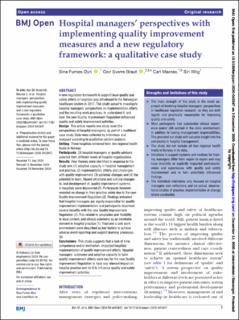| dc.contributor.author | Øyri, Sina Furnes | |
| dc.contributor.author | Braut, Geir Sverre | |
| dc.contributor.author | Macrae, Carl James | |
| dc.contributor.author | Wiig, Siri | |
| dc.coverage.spatial | Norge | en_US |
| dc.date.accessioned | 2021-01-26T12:19:29Z | |
| dc.date.available | 2021-01-26T12:19:29Z | |
| dc.date.created | 2020-11-19T14:25:34Z | |
| dc.date.issued | 2020-11 | |
| dc.identifier.citation | Øyri SF, Braut GS, Macrae C, et al. (2020) Hospital managers’ perspectives with implementing quality improvement measures and a new regulatory framework: a qualitative case study. BMJ Open;10:e042847 | en_US |
| dc.identifier.issn | 2044-6055 | |
| dc.identifier.uri | https://hdl.handle.net/11250/2724774 | |
| dc.description.abstract | A new regulatory framework to support local quality and safety efforts in hospitals was introduced to the Norwegian healthcare system in 2017. This study aimed to investigate hospital managers’ perspectives on implementation efforts and the resulting work practices, to understand if, and how, the new Quality Improvement Regulation influenced quality and safety improvement activities.
Design This article reports one study level (the perspectives of hospital managers), as part of a multilevel case study. Data were collected by interviews and analysed according to qualitative content analysis.
Setting Three hospitals retrieved from two regional health trusts in Norway.
Participants 20 hospital managers or quality advisers selected from different levels of hospital organisations.
Results Four themes were identified in response to the study aim: (1) adaptive capacity in hospital management and practice, (2) implementation efforts and challenges with quality improvement, (3) systemic changes and (4) the potential to learn. Recent structural and cultural changes to, and development of, quality improvement systems in hospitals were discovered (3). Participants however, revealed no change in their practice solely due to the new Quality Improvement Regulation (2). Findings indicated that hospital managers are legally responsible for quality improvement implementation and participants described several benefits with the new Quality Improvement Regulation (2). This related to adaptation and flexibility to local context, and clinical autonomy as an inevitable element in hospital practice (1). Trust and a safe work environment were described as key factors to achieve adverse event reporting and support learning processes (4).
Conclusions This study suggests that a lack of time, competence and/or motivation, impacted hospitals’ implementation of quality improvement efforts. Hospital managers’ autonomy and adaptive capacity to tailor quality improvement efforts were key for the new Quality Improvement Regulation to have any relevant impact on hospital practice and for it to influence quality and safety improvement activities. | en_US |
| dc.language.iso | eng | en_US |
| dc.publisher | BMJ Publishing Group | en_US |
| dc.rights | Navngivelse-Ikkekommersiell 4.0 Internasjonal | * |
| dc.rights.uri | http://creativecommons.org/licenses/by-nc/4.0/deed.no | * |
| dc.subject | reform i helsevesenet | en_US |
| dc.subject | pasientsikkerhet | en_US |
| dc.title | Hospital managers’ perspectives with implementing quality improvement measures and a new regulatory framework - a qualitative case study | en_US |
| dc.type | Peer reviewed | en_US |
| dc.type | Journal article | en_US |
| dc.description.version | publishedVersion | en_US |
| dc.rights.holder | © Author(s) 2020 | en_US |
| dc.subject.nsi | VDP::Medisinske Fag: 700 | en_US |
| dc.source.volume | 10 | en_US |
| dc.source.journal | BMJ Open | en_US |
| dc.source.issue | 12 | en_US |
| dc.identifier.doi | 10.1136/bmjopen-2020-042847 | |
| dc.identifier.cristin | 1849943 | |
| dc.relation.project | SHARE - Centre for Resilience in Healthcare: 5091 | en_US |
| dc.source.articlenumber | e042847 | en_US |
| cristin.ispublished | true | |
| cristin.fulltext | original | |
| cristin.qualitycode | 1 | |

